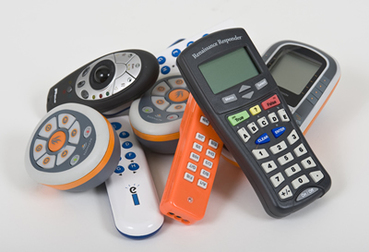
"Take out your devices. We are going to have a little quiz before we begin math today."
Were they excited to take a quiz? Yes, in a sense.
The main reason my students were so excited was because I said, "Take out your devices." My students all have an Interactive Response Device. We call them "devices" for short. They are used to gather data from my students (in the form of little quiz questions), and I use the immediate feedback to drive my instruction throughout the lesson. They love using the devices. Here are some of the ways I use the devices to keep students engaged EVERYDAY.
Expectations
As with any routine classroom procedure, my students know the expectations for using the devices. They know I have the ability check to see exactly how they are voting. This keeps students from just pressing any old answer. I also set a timer on the "vote" so students have to respond in a timely fashion. They know they cannot get "points" if 100% of people do not vote within the specified time. See below in "Team Work" for more information about the points. They also know that these "quizzes" are not graded, so the stress level is kept to a minimum.
Team Work
My class works as a team to help each other understand the questions. It is not unlikely to hear students asking each other for help, or to overhear a student explaining a good strategy to his/her group. This part of my math lesson plays an integral role in the daily instruction. Just listening to the dialogue between students allows me to understand so much about where they are in the learning process. What does this have to do with the devices? For every question where 100% of my students get the right answer, the class (as a whole) earns points towards a classroom reward.
There are times when 90% get the right answer. Students beg me to give them another try. I do, only if a student volunteers to explain what the 10% incorrect probably did wrong. The computer never shows the class who answered incorrectly, but I say, "Listen carefully to [so-and-so] if you missed this!" After a student passionately explains HOW and WHY the correct answer makes sense, there are usually a few more students ready to chime in with more tips. I also use this as a time to remind students to use math vocabulary in their explanations, but oftentimes, students will beat me to it. They REALLY work hard to make sure all students understand so they can get points! On days when the class is especially engaged, I award extra class points!
Step-by-Step Check
We use devices to answer questions throughout the entire lesson. Not only do I see what students need to learn, but individuals realize it immediately if they are missing something. It gives us all immediate feedback.
Each day begins with a review of old material. Usually students have already completed the questions for morning work, so it is a quick review. It is easy to see what needs clarification before moving on.
Before the new lesson begins, I ask a few questions that will be used to check for understanding at the end of the lesson. I also pose them at the beginning to see where my instruction needs to begin. Students respond with devices, and we keep track of which answers have the most votes. I do not tell the students what the correct answer is. They know they will have those questions again at the end, and the right answers will be revealed then.
As the lesson progresses, I ask various questions. My favorite type of question does not require students to complete a whole problem, but rather they are to answer a thinking question. I may just ask something like, "Do we need to regroup?" Throughout the lesson, I often ask many yes/no/? questions. The ? allows for students to show they just do not understand without guessing. I slow down or speed up depending on the immediate data. As students show more understanding, I demand more independent work.
If I get to a part of the lesson where about eight students are consistently missing answers, I give the whole class independent problems to work on as I privately check to see who the struggling students are. As everyone works quietly, I walk around to check on those specific struggling students. I do not make it obvious with overwhelming attention on them, but this really helps me with my instruction.
At the end of the lesson, we go back to those questions from the beginning. I give students the chance to clarify anything or give tips to the whole class. Then the students vote on the answers again. Oftentimes, 100% of students get the correct answer on at least one of them. When we can, we take time to reflect on why they were able to get the correct answer at the end. I say, "What did you learn that made the big difference?" If a student does miss the final questions, sometimes he/she will come to me quietly and ask for a little more help, but if they do not, I can go to them. I can always privately see how each individual voted, or answered.
If we do not use the devices, my students are really disappointed (and so am I). They feel like using them makes lessons more interactive and fun. I know that using them makes me a more effective teacher, and the learning process is much more efficient. The devices are... bah ha ha ha ha ha... my secret weapon!
 RSS Feed
RSS Feed